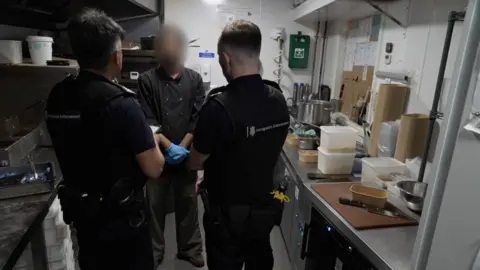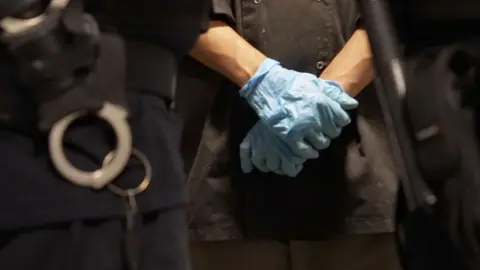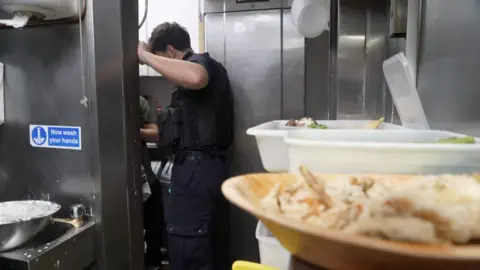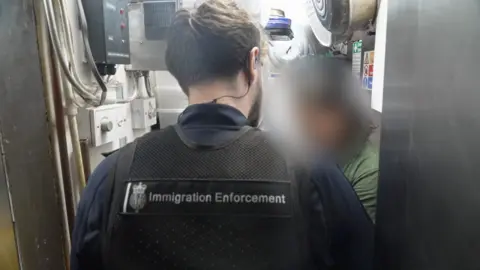Popular food spots hiding a world of exploitation
 BBC
BBCIt's Friday night in central London, and immigration officers have intel that a man is working illegally in a dark kitchen - a collection of faceless businesses in a warehouse which exclusively offer food delivery and takeaways without the dining area.
Officers enter a hot, cramped kitchen in force, where they find a chef cooking alone.
A camera perched on a shelf nearby is seemingly monitoring his every move as orders on a tiny electronic machine ping in thick and fast.
Officers arrest the man for overstaying his visa and working illegally. He is calm, compliant, but clearly stressed.

The raid, which I joined, is part of a Home Office crackdown on illegal working and focused on popular food spots in the capital.
Sean Whippy is the chief immigration officer at Immigration Compliance and Enforcement (ICE) in central London.
He says dark kitchens can be problematic as they're away from the public eye.
"If they're tucked away, who is monitoring that? There is nowhere for the public to report bad working conditions.
"Dark kitchens run 24/7 - that's what their licenses will allow them to do. So we have to find out what shifts he's working."

Illegal working arrests up by 40%
Since July 2024 Immigration Enforcement has carried out 6,784 illegal working visits to premises and made 4,779 arrests – an increase of 40% and 42% compared to the same period 12 months ago.
In that time, 1,508 civil penalty notices have been issued, with employers facing fines of up to £60,000 per illegal worker.
Arrests can also lead to director disqualifications, and in serious cases, a prison sentence of up to five years.
Illegal workers arrested are either placed on immigration bail, or if they have no right to be in the UK, may be deported through voluntary or enforced means.
The man arrested in the dark kitchen is taken home to collect his belongings and is found to be living in overcrowded, squalid conditions.
He is placed on strict immigration bail and is required to report regularly to the Home Office.

Those who claim asylum in the UK are not normally allowed to work while their claim is considered.
The Home Office usually provides accommodation support and a weekly allowance to cover other essential living needs, which is £49.18 per person in self-catered accommodation and £8.86 per person in catered accommodation.
Paid less than £1 an hour
One 17-year-old asylum seeker has told the BBC he turned to illegal work as he was "unable to survive on the allowance".
Ali - not his real name - arrived in the UK from Turkey in 2023. He began working for less than £1 an hour in a north London barbers.
"My shifts were 12 hours. They were paying me £50 per week.
"Yes, it is illegal, but a 16,17,18 year old young woman or man has additional costs and they have to work because the family has no money. The people they know have no money. You start life a little younger here."
Ali, who quit the job and is now in college, says he lived in fear of being found out.
"It's such a terrible feeling. You have to work because you need it.
"You ask yourself, if I'm caught, will they send me back? Or will they give me a prison sentence?
"Or what kind of punishment will they give me? There are even some times when I go to bed at night, I couldn't sleep. This is also a difficult situation."

Later in the evening, officers attend a busy restaurant in central London where they have previously arrested individuals for illegal working. They have intel that there are more.
It's peak service, and diners stare perplexed as immigration officers walk through the narrow alleyway of the restaurant in force.
In the cramped basement kitchen everybody is questioned including one man found hiding in a back room.
Two students are arrested for potentially breached their working visa conditions.
In a busy stairwell downstairs, they are questioned for hours about work rotas and payslips as the officers try to find evidence of illegal working.
They are later de-arrested due to a lack of evidence.
'Rise in asylum seekers turning to illegal work'
The Refugee Workers Cultural Association has seen a rise in asylum seekers turning to illegal work.
Chairperson Ibrahim Avcil believes legislation reform is needed "in favour of asylum seekers enabling them to work as they arrive in the UK".
He added: "Because rather than people working without paying taxes, it is always beneficial for people to work and pay their taxes here in the UK."
Dame Angela Eagle, Minister for Border Security and Asylum, said: "Enforcement teams across the UK are working tirelessly to stop illegal working and the exploitation of vulnerable people.
"Clamping down on illegal working in all its forms is a critical part of this government's plan to strengthen the entire immigration system and disable the people smuggling gangs who sell false promises to migrants about their ability to work in the UK."
The government is introducing new laws on illegal working through the Border Security, Asylum and Immigration Bill by extending Right to Work checks on those hiring gig economy and zero-hours workers in sectors like construction, food delivery, beauty salons and courier services.
Listen to the best of BBC Radio London on Sounds and follow BBC London on Facebook, X and Instagram. Send your story ideas to [email protected]
